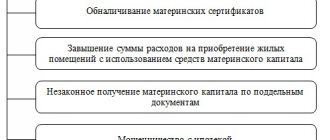One of the types of theft provided for by criminal law is fraud. In turn, the criminal actions that are described in Art. 159 of the Criminal Code of the Russian Federation, have several qualifying characteristics. One of them is the criminal’s use of his position and the opportunities that the service gives him. This type of criminal action is provided for by a separate norm - part 3 of this article. But what is theft or fraud by abuse of position?
What is fraud?
Fraud is a type of criminal economic crime, which is the taking of someone else's property for personal purposes through deception or breach of trust. The victim, who has become a victim of a criminal, voluntarily gives him money, things, real estate, and other material assets. After some time, he realizes that the attacker was not acting in his interests.
The Criminal Code of the Russian Federation provides for several forms of fraud:
- simple composition;
- crimes in the field of lending;
- crimes when receiving social benefits, pensions and compensation;
- crimes in the field of use of electronic means of payment;
- insurance crimes;
- crimes in the field of computer information.
Each composition defines the minimum amount of funds, in the event of loss of which the victim has the right to apply for the initiation of a criminal case. If your application was refused or the criminal case based on your application was illegally terminated, we recommend that you seek help from a fraud lawyer at SKP. We will make sure that law enforcement agencies respond to your request and correctly classify the act as fraud.
Definition
To accurately characterize this type of crime, the following must be considered:
- Clause 1 of the Notes (Resolution of the Plenum of the Supreme Court of the Russian Federation of December 27, 2002 No. 29 “On judicial practice in cases of theft, robbery and robbery”) to Art. 158 – there is a general definition given for theft. It also applies to fraud, since it is only a type of theft.
- Part 1 art. 159 of the Criminal Code of the Russian Federation - it contains general elements of the crime of fraud.
- Actually, part 3 of the same article - it contains the qualifying signs of this type of act.
The key feature of this type of crime is the method of its commission. The act considered under Part 3 of the General Article differs from ordinary fraud in that the offender uses such factors as the position he holds and the official opportunities associated with it.
The law does not determine what exactly the position of the perpetrator should be. The main thing for Part 3 of Art. 159 of the Criminal Code of the Russian Federation means that the villain not only stole something through deception (or abused trust), but also used the opportunities that were provided to him in connection with his service.
Thus, in order for fraud to be considered as committed using a position in the service, the following characteristics are required:
- The criminal occupies one of the management positions that gives him certain powers.
- The guilty person actually had these powers.
- The powers were used to commit a crime.
The last sign is especially important. If an official turns out to be a fraudster “in private life” and commits a crime without in any way using the powers granted to him by law, his actions will be qualified according to other norms of the Criminal Code of the Russian Federation (in particular, according to Part 1 of Article 159, etc.).
What exactly is meant by official position?
Here we should be guided by the definition given by the Plenum of the Armed Forces of the Russian Federation in Resolution No. 51 of 2022. It indicates that in cases involving fraud (as well as misappropriation or embezzlement), persons taking advantage of their official position are understood to mean:
- Officials - that is, people who perform (even if only on a one-time basis) the functions of a representative of a government agency, as well as those endowed with administrative, organizational, administrative or economic powers (even those not related to government agencies).
- State or municipal employees who are not officials.
Important. In the event that the fraud was committed with complicity, but the remaining accomplices do not have the above characteristics, their actions may be qualified under Part 3 of Art. 159 taking into account the provisions of Art. 33 of the Criminal Code of the Russian Federation.
How are fraud cases investigated?
Cases of fraud are within the competence of investigators of the Ministry of Internal Affairs. Typically, an inquiry is carried out when a crime is committed under Part 1 of Article 159 of the Criminal Code of the Russian Federation. The rest of the cases are being investigated by investigators from investigative departments. As a rule, the preliminary investigation takes from 2 to 6 months.
The inquiry officer and investigator must establish the presence of the following circumstances:
- crime event;
- the circumstances of the fraudulent activity;
- the guilt of the suspect;
- the nature and extent of the damage caused.
When conducting investigative activities, the requirements of criminal procedural legislation must be observed. If the investigation is delayed and the responsible officials fail to act, it is advisable for the victim to seek help from an SKP company lawyer. Our specialists will familiarize themselves with the case materials and, if there are violations of mandatory procedures, will file a complaint against the actions or inactions of the inquiry officer and investigator.
Civil liability for theft using ESP. Analysis of modern judicial practice
Nikolay Pyatiizbyantsev, head of the department for combating fraud in the field of information security of the Information Protection Department, Bank GPB (JSC), considers the issues of distribution of civil liability between the bank and the client in the event of theft of funds from the client account by third parties through the prism of judicial practice.
Until recently, the distribution of civil liability between the bank and the client in the event of theft of funds from the client’s account by third parties was mainly regulated by Article 9 of the Federal Law “ On the National Payment System” 161-FZ: “15. If the money transfer operator fulfills the obligation to notify the client - an individual about the transaction completed in accordance with part 4 of this article and the client - an individual sent a notification to the money transfer operator in accordance with part 11 of this article, the transfer operator funds must reimburse the client for the amount of the specified transaction performed without the client’s consent before the client, an individual, sent a notification. In this case, the money transfer operator is obliged to reimburse the amount of the transaction performed without the client’s consent, unless he proves that the client violated the procedure for using an electronic means of payment, which resulted in the transaction being carried out without the consent of the client - an individual
».
That is, the obligation to reimburse the amount of the transaction completed before the notification was sent exists only in relation to individuals. Legal entities do not have the right to receive such compensation; all notifications not authorized until the moment of sending to the bank are within their area of responsibility. But until recently, individuals also had little chance of receiving compensation from banks, since, as a rule, banks found violations in the actions of clients in the procedure for using ESP.
Position of the courts
The position of the courts, as a rule, was as follows: “collection of damages ... is possible only if there is a set of conditions of liability provided for by law:
- documented fact of violation of rights and legitimate interests, resulting in damages, i.e. the basis for liability in the form of compensation for losses;
- the fact that the defendant committed an unlawful act, as well as the presence of his guilt in committing the said unlawful act;
- the presence of a cause-and-effect relationship between the adverse consequences that have arisen and the unlawful actions of the harm-doer.
The absence of at least one of these grounds does not give the right to compensation for losses" (Resolution of the Arbitration Court of the Krasnoyarsk Territory dated March 28, 2019. Case No. A33-32487/2018).
If the client causes losses, the bank is liable if there is any violation and a cause-and-effect relationship between the bank’s actions and the damage.
Refusal of authorization is not a suspension of execution of an order, but a refusal to execute an order
However, after the advent of Federal Law No. 167-FZ of June 27, 2018, banks were given a new responsibility to identify transactions unauthorized by clients. The implementation of this norm is especially problematic for card transactions. The fact is that when a suspicious transaction is detected, the bank is obliged to suspend the execution of the order and the use of the ESP; then ask the client for confirmation; upon confirmation, resume execution of the order and use of the ESP; If it is impossible to contact the client, the bank must resume executing the order and using the ESP in two days. From the point of view of payment card technology, this is impossible in principle, since the issuer has only a few seconds to respond to an authorization request (request to carry out a transaction). If the issuer does not respond within the specified time, the transaction will either be rejected (the issuer is unavailable), or the payment system itself will respond instead of the issuer. In such a situation, it is impossible to have time to contact the client and find out from him the legitimacy of the operation. In this regard, the Bank of Russia explained how compliance with this requirement can be interpreted. Letter of the Central Bank of the Russian Federation dated December 7, 2018 No. 56-3-2/226: “According to the position of a number of payment system operators, taking into account the technology of conducting transactions for transferring funds using payment cards, the term “Suspension of execution of an order” should be understood as a refusal to authorize the operation, while “Resuming the execution of an order” means ensuring the possibility of carrying out, at the client’s request, the authorization of an operation similar to the suspended one.”
However, in addition to the requirement to suspend and resume execution of Order 167-FZ, it also requires suspending and resuming the use of ESP. If resuming the execution of an order means ensuring the possibility of carrying out, at the client’s request, the authorization of an operation similar to the suspended one, then what does the resumption of the use of electronic security means (what is different)? It seems that refusal of authorization is still not a suspension of execution of an order, but a refusal to execute an order. And when “Resuming execution of an order”, the client will have to give the specified order again. Which does not fully comply with the requirements of the law.
It is surprising that when this bill was considered in the State Duma, where it was adopted in the third and final reading, it was positioned as specifically intended for card transactions.
167-FZ indicates that the signs of a transfer of funds without the client’s consent are established by the Bank of Russia, which was carried out by Order of the Bank of Russia dated September 27, 2018 No. OD-2525. The third sign raises the biggest question due to its uncertainty:
"3. Inconsistency of the nature, and (or) parameters, and (or) volume of the operation performed (time (days) of the operation, place of the operation, the device with which the operation is carried out, and the parameters of its use, the amount of the operation, the frequency (frequency) of the operation operations, recipient of funds) operations usually performed by a client of a money transfer operator (activities carried out by the client).”
What is this discrepancy expressed in, how is it determined, can it be measured? Is this any deviation from the client’s profile (which? from which? how to count?), or any discrepancy (new recipient, terminal, new amount, time)? In this case, as a rule (unless the client himself is a fraudster), any unauthorized (fraudulent) operation is usually not performed by the client. That is, if a bank misses some unauthorized transaction, it actually does not comply with the requirements of the law. Even taking into account the clarifications of the Central Bank of the Russian Federation for payment card technology, fulfilling this norm is not an easy task. It is necessary to implement online monitoring systems in real time - “the first operation stops - the fraud monitoring system works “in a gap.” The fact is that in online and mobile banking systems there are no problems with suspending the first (fraudulent) transaction, since the bank receives the order directly from its client and can calmly analyze it and then send it for execution. In the case of card transactions at terminals, the bank receives an order not directly from the client, but through the payment system, and in this case it has less than 1 second of time to analyze the transaction (for example, the client uses an ATM). Therefore, here we have to “break into” the standard authorization process (work “in a gap”). Often banks detect a fraudulent transaction, but do not stop it, but block the card itself, i.e., do not allow the following operations to be performed.
Online monitoring is a serious modification, it requires large computing power, fraud monitoring becomes a “bottleneck”, increases transaction time, which together can lead to a refusal (“the issuer is unavailable”) or a processing response to an authorization request without taking into account the antifraud decision. Either the bank is forced to accept the risk of losses and skip the first fraudulent transaction, and block the ESP as a response to it.
Judicial practice of applying the requirements of 167-FZ
In 2022, the first judicial practice appeared on the issue of applying the requirements of 167-FZ. Let's give just a few examples.
Zarechensky City Court of the Penza Region. 05/15/2019. Case No. 2-385/2019. On September 13, 2018, without the consent of the plaintiff, a paid card was connected and the card of PJSC POST-BANK was reissued. In the period from September 13, 2018 to October 29, 2018, all funds deposited under the deposit agreement dated May 21, 2018 No. 32279259 in the total amount of RUB 1,403,894.74 were withdrawn from the plaintiff’s account and without his consent.
From the court decision: “ In accordance with part 5.1. Article 8 of the Federal Law of June 27, 2011 No. 161-FZ “On the National Payment System”, the money transfer operator, when he identifies an operation that corresponds to the signs of a money transfer without the client’s consent, is obliged to write off funds from the client’s bank account for a period of time no more than two working days to suspend the execution of an order to carry out a transaction that meets the criteria for transferring funds without the client’s consent.” The court decided: “To recover from PJSC POST-BANK damages in the amount of 1,403,894 (One million four hundred three thousand eight hundred ninety-four) rubles 74 kopecks
».
Leninsky District Court of Yaroslavl 07/24/2019. Case No. 2-765/2019. Money was written off from the plaintiff's accounts without authorization, without the plaintiff's order.
From the court decision: “ In accordance with Part 5.1 of Art. 8 Federal Law No. 161-FZ, the money transfer operator, when he identifies a transaction that corresponds to the signs of a money transfer without the client’s consent, is obliged, before debiting funds from the client’s bank account, for a period of no more than two working days, to suspend the execution of the order to complete the transaction, corresponding to the signs of a funds transfer without the client’s consent.
In the case, it was established that, based on the nature, parameters and volume of transactions for the transfer from the accounts of N. M. Biserova of all funds available on them to the account of another person in another bank, Tinkoff Bank JSC had sufficient grounds to conclude that they inconsistency with transactions usually performed by the client, and suspend the execution of orders for transactions that meet the criteria for transferring funds without the client’s consent.
The bank did not comply with the above requirements of the law, N. M. Biserova was not informed in the prescribed manner about the receipt of an order to carry out transactions that corresponded to the signs of a transfer of funds without the client’s consent, and the orders were executed before the expiration of two working days.”
The court decided: “To recover in favor of N.M. Biserova. with Tinkoff Bank JSC for damages of 289,968 rubles, interest for the use of other people's funds 11,133 rubles 97 kopecks, compensation for moral damages of 10,000 rubles, fine 155,550 rubles 98 kopecks
».
New requirements of the Central Bank: the legitimacy of the use of SMS passwords is in question?
The Central Bank's requirement calls into question the legitimacy of using SMS passwords as a simple electronic signature
Simultaneously with the requirement of Federal Law 167-FZ that we considered, banks must comply with various requirements of the Bank of Russia. In particular, “Regulations on the requirements for ensuring the protection of information when making money transfers and on the procedure for the Bank of Russia to monitor compliance with the requirements for ensuring the protection of information when making money transfers” No. 382-P of the Central Bank of the Russian Federation dated June 9, 2012 and “Regulations on establishing mandatory requirements for credit institutions to ensure the protection of information when carrying out banking activities in order to counteract the transfer of funds without the client’s consent” No. 683-P of the Central Bank of the Russian Federation dated April 17, 2019. Failure to comply with these requirements may also result in the bank being charged with causing damage.
Why are we addressing them in this article? The fact is that these regulations include requirements that will soon come into force (No. 382-P - from 01.01.20, No. 683-P - from 01.01.21, and also from 01.01.23) and the implementation of which will play a significant role in the security of money transfers. This, for example, is the use of certified application software and applications, vulnerability analysis and monitoring the absence of undeclared capabilities, restrictions on operation parameters, the client’s use of independent software environments for preparing and confirming electronic messages, external audit in accordance with 382-P and GOST R 57580.1-2017, signing electronic messages in a manner that ensures the integrity and confirms the composition of the specified electronic message by an authorized person.
The latter requirement calls into question the legitimacy of using SMS passwords as a simple electronic signature or an analogue of a handwritten signature. This is also indicated by the Determination of the Judicial Collegium for Civil Cases of the Armed Forces of the Russian Federation dated January 10, 2017 No. 4-KG16-66: “ to confirm the order to transfer funds to the corresponding subscriber number, the Bank sent non-personalized passwords that required entering a certain combination of characters to confirm the previously sent order .
Such measures are aimed primarily at preventing the execution of erroneous and accidental orders, but it does not follow from this that the account owner or his authorized representative in possession of the corresponding code or password is thereby identified.
On the contrary, the operation of entering a one-time non-personalized password sent by the bank is available to any person currently using a subscriber device of the mobile telephone network
».
An example of a bank’s liability for failure to comply with the requirements of Regulation No. 382-P is the decision of the Arbitration Court of the Samara Region dated December 5, 2018. Case No. A55-14526/2018:
«On May 10, 2022, the plaintiff, through the Internet Client system, generated payment order No. 196, which transferred funds to ZOOVETSNAB LLC in the amount of 1,200,000 rubles.
At 16.37 the Bank called Leader LLC from the number (495) 777-11-00. According to the plaintiff’s explanations, an employee of Rosselkhozbank JSC, during a telephone conversation, first reported that payment order No. 196, in respect of which an application was left, had not been processed, but then reported that he had made a mistake and the payment had been processed.
The Bank of Russia approved the Regulation on requirements for ensuring the protection of information ... No. 382-P, which establishes numerous requirements for the bank when making money transfers, including through remote banking systems, namely:
- The Bank is obliged to consider any event that may lead to the debiting of money from the client’s account without his consent as an incident and react accordingly, which the Bank did not do in the present case; (violation of clause 2.1 of Regulation No. 382-P);
- The Bank is obliged to ensure that it is impossible for malicious software to penetrate the Internet Client system (violation of clause 2.5.7 of Regulation No. 382-P);
- The Client took all possible measures to block the disputed transfer, but the Bank actually blocked this opportunity without taking appropriate measures aimed at preventing unauthorized debiting of funds from the Client’s account (violation of clause 2.6.9 of Regulation No. 382-P).
In addition, clause 2.10.4 of Regulation No. 382-P provides for a whole range of measures that must be taken by the Bank to ensure security, which were not carried out by the Bank:
- The Bank failed to identify falsified electronic messages, including imitation by third parties of customer actions when using electronic means of payment, and the implementation of transactions related to the transfer of funds by an attacker on behalf of the client;
- The bank did not reconcile the output electronic messages with the corresponding input and processed electronic messages when making payments in the payment system.
In the present case, there are circumstances that, with due diligence, allowed the defendant to doubt the legitimacy of the information about transfers entered into the System and to suspend their execution:
- transfers in the amount of more than 1,000,000 rubles were not typical for the plaintiff;
- Global LLC has never been a counterparty of the plaintiff, there have been no payments to this person or from him previously;
- Previously, payments for such large amounts were agreed upon by the Bank with the Client, which is not refuted by the Respondent;
- the actions (inaction) of the Bank as a professional participant in the payment system cannot be considered as meeting the requirements of reasonableness and prudence and resulted in losses in the declared amount.
To recover from the Joint Stock Company "Rosselkhozbank" in favor of the Limited Liability Company "Leader" 1,200,000 rubles. losses, as well as 25,000 rubles. expenses for payment of state duty."
When the court sides with the bank
But does this example mean that banks will always lose claims in case of theft of funds from customer accounts by third parties? Judicial practice shows that in certain cases the court sides with the bank and rejects the client’s claim. Arbitration Court of the Rostov Region, 06/27/2019. Case No. A53-5074/2019. 11/23/2018: through the remote banking system, the Bank received payment orders No. 347-392, 395-440 in the amount of 93 pieces for a total amount of 874,273 rubles, signed with the correct electronic signature of the company’s authorized person, from the IP address of Rendezvous Brewery LLC " According to the plaintiff, the Bank violated the provisions of Part 5.1 of Art. 8 of the Law “On the National Payment System” that the money transfer operator, if it identifies an operation that corresponds to the signs of a money transfer without the client’s consent, is obliged to suspend the debiting of funds from the client’s bank account for a period of no more than two working days execution of an order to carry out a transaction that meets the criteria for transferring funds without the client’s consent. The plaintiff claims that in accordance with the order of the Bank of Russia dated September 27, 2018 No. OD-2525 “Signs of carrying out funds without the client’s consent,” all 93 transactions fully fall within the criteria established by the Bank of Russia, namely: “Inconsistency of nature and (or) parameters , and (or) the volume of the operation performed (time (days) of the operation, location of the operation, the device used to carry out the operation and the parameters of its use, the amount of the operation, the frequency (frequency) of the operation, the recipient of funds) operations, usually performed by the client of the money transfer operator (activities carried out by the client).”
The bank did not agree with the claim and stated that the reason for the theft of funds was the client’s failure to comply with information security requirements, which allowed the attackers to steal the funds:
«In the Bank’s opinion, the probable reason that made it possible to remotely change the details of payment orders before sending them to the Bank was the failure of Rendezvous Brewery LLC to fully comply with the Bank’s recommendations within the framework of the Terms of Service for RBS (Remote Banking Services), which are an integral part of the provision agreement No. 300217000001 from 04/03/2017.
When connecting the remote banking system of Rendezvous Brewery LLC, the Bank provided recommendations on ensuring information security in the remote banking system (hereinafter referred to as recommendations). In accordance with paragraphs. 6 paragraph 1 of the recommendations, it was recommended to exclude from computers visiting sites of dubious content and any other Internet resources (social networks, forums, chat rooms, telephone services, etc.), as well as reading mail and opening mail documents from unreliable sources. In addition, in accordance with paragraphs. 11 clause 1, it was recommended to exclude the launch and operation of services (both built into the OS and third-party) that allow remote access to the computer, including for the purpose of administration and maintenance.
- During the inspection, it was found that the computer used to carry out operations in the remote banking system is also used for everyday work, including viewing various sites and messages received by e-mail; there is software for remote access to the workstation.
- The account has administrator rights (that is, its rights are not limited), and the computer also has software that provides remote access to the computer.
In certain cases, the court sides with the bank and rejects the claim of a client who has become a victim of criminals
In accordance with paragraphs. 1 point 4 recommendations in case of computer malfunctions or breakdowns while working in the remote banking system or immediately after the session (problems loading the operating system, hard drive failure, etc.), you should immediately remove the electronic keys and turn them off computer, and also contact the Bank and make sure that no unauthorized transactions were carried out on behalf of the organization (by reconciling transactions for the day). In violation of these recommendations, a request from Rendezvous Brewery LLC was received only on November 27, 2018, upon the discovery of an unauthorized debit of funds
"
As for the requirement of 167-FZ to identify suspicious transactions, the bank stated that the transactions were checked in accordance with the criteria approved by the Bank of Russia order OD-2525 dated September 27, 2018, and were recognized as characteristic and executed without suspension. It is unclear on what basis, but the court agreed with the bank’s arguments, indicating that: “ The system for identifying suspicious transactions complies with the order of the Bank of Russia dated September 27, 2018 “OD-2525.”
It is not within the purview of the plaintiff to assess its perfection .”
What convinced the court that 93 transactions of 9,400 rubles to the new recipient are not suspicious from the point of view of the order of the Central Bank of the Russian Federation? Why is the assessment of the fraud monitoring system not within the competence of the plaintiff (the client knows well what operations he usually performs)? Whose responsibility is this assessment? The court did not clarify these issues and rejected the claim.
More interesting is the decision of the Moscow Arbitration Court dated May 13, 2019. Case No. A40-46302/19-26-314. In this case, the bank also proved that the cause of the theft was the client’s failure to comply with information security requirements, and not the bank’s failure to comply with 167-FZ. But at the same time, the bank proved to the court that its fraud monitoring system analyzed fraudulent transactions for their suspicion and recognized their parameters as usually performed by the client: “ it follows from the bank’s explanations that the Claimant’s disputed transactions were verified according to the criteria for suspicious transfers established by the Bank:
- the time of transactions corresponds to the working day established in Russia (from 9:00 to 18:00), the disputed transactions were carried out on Tuesday, 10/30/2018, in the period from 11:09 to 12:42, which corresponds to the usual time for transactions by the Client;
- instructions No. 3524, No. 3525, No. 3526, No. 3527, No. 3528, No. 3529, No. 3530 dated 10.30.2018 were entered into the PSB On-Line system from a computer that had previously been repeatedly used by BSK-Belgorod LLC to enter PSB On-Line. The connection was established from the IP address 82.151.124.106 – rostelecom.ru, Russian Federation, Belgorodskaya oblast', Belgorod. This is the Client’s usual address from which he previously logged into the Client-Bank and did not dispute these payments;
- orders No. 3524, No. 3525, No. 3526, No. 3527, No. 3528, No. 3529, No. 3530 dated October 30, 2018 contained a correct electronic signature (ES) of the authorized person of BSK-Belgorod LLC (Certificate No. 544030930182802860617343783, owner: Ts Urupa Mikhail Alexandrovich . The certificate was valid at the time of the operations);
- until 10/30/2018, BSK-Belgorod LLC repeatedly transferred funds to the accounts of individuals (01/18/2018 - 28 transfers, 04/10/2018 - 7 transfers, 08/10/2018 - 29 transfers, 09/10/2018 - 30 transfers, 10/10/2018 – 29 translations, etc.);
- amounts of orders No. 3524 (RUB 349,900), No. 3525 (RUB 349,980), No. 3526 (RUB 349,870), No. 3527 (RUB 349,871), No. 3528 (RUB 349,966), No. 3529 ( 349,991 rubles), No. 3530 (80,000 rubles) dated 10/30/2018 correspond to the amounts of other previously carried out transactions (cf. payment dated 09/28/2018 for 365,660 rubles, payments dated 10/17/2018 for 336,911.94 rubles. , for 366,900.80 rubles, payments from 04/04/2018, from 05/29/2018 for 80,000 rubles)
The bank needs to make much more effort to prove its position than the client
Thus, there were no violations on the part of Promsvyazbank PJSC when executing payment orders No. 3524, No. 3525, No. 3526, No. 3527, No. 3528, No. 3529, No. 3530 dated October 30, 2018; the orders were received by the Bank on behalf of LLC “ BSK-Belgorod" and contained a correct electronic signature of the Client’s authorized person (Tsurupa M.A.), and therefore legally executed by the Bank
" Since no violations were established in the bank’s actions in executing the disputed payment orders, the plaintiff’s claims were recognized by the court as not subject to satisfaction.
Instead of an afterword
Concluding the analysis of civil liability in cases of theft of funds from bank clients using ESP, I would like to draw attention to Resolution of the Plenum of the Supreme Court of the Russian Federation dated March 24, 2016 No. 7 “On the application by courts of certain provisions of the Civil Code of the Russian Federation on liability for violation of obligations” :
«5. Within the meaning of Articles 15 and 393 of the Civil Code of the Russian Federation, the creditor provides evidence confirming the existence of losses, as well as substantiating with a reasonable degree of certainty their size and the causal relationship between the non-fulfillment or improper fulfillment of the obligation by the debtor and the named losses.
The debtor has the right to raise objections regarding the amount of losses caused to the creditor and provide evidence that the creditor could have reduced such losses, but did not take reasonable measures to do so (Article 404 of the Civil Code of the Russian Federation).
A debtor who refutes the creditor's arguments regarding the causal connection between his behavior and the creditor's losses is not deprived of the opportunity to present evidence of the existence of another reason for the occurrence of these losses.
The debtor's guilt in violating the obligation is assumed until the contrary is proven. The absence of guilt in non-fulfillment or improper fulfillment of an obligation is proven by the debtor (clause 2 of Article 401 of the Civil Code of the Russian Federation)
».
In civil proceedings, the client (plaintiff, creditor) will prove that the damage arose through the fault of the bank (defendant, debtor) as a result of improper performance of its duties. The bank, in turn, has the right to prove that the damage was caused by the client’s actions. Whoever is more convincing to the court has a greater chance of winning the case. The bank must take into account that to prove its position it needs to make much more efforts, since its guilt is assumed from the very beginning. And in this case, it is preferable that the regulatory requirements of the regulator (382-P, 683-P) be fully complied with.
How is fraud proven?
During a fraud investigation, investigators are required to collect materials confirming the occurrence of a crime and the guilt of the suspect.
As a rule, the following is assessed as evidence:
- testimony of the suspect;
- explanations of the victim;
- witness's testimonies;
- expert opinion;
- investigative protocols;
- evidence.
It is important to ensure that an indictment is drawn up and the materials are sent to the court for consideration. The lawyers of the SKP company, who have the necessary experience and knowledge in the field of investigating and proving crimes related to fraud, will help you with this. We will select the optimal strategy for protecting the victim in order to impose a fair punishment on the offender and compensate for the damage suffered.
Services of a lawyer in cases of fraud
To determine the optimal line of defense, SKP company lawyers conduct their own investigation, on the basis of which the prospects for solving the problem in favor of the victim are determined.
As part of providing legal assistance, our specialists provide the following services:
- advise the victim on all issues;
- prepare the evidence base;
- organize negotiations with the suspect;
- participate in investigative actions on behalf of the victim;
- prepare statements and petitions;
- appeal unlawful decisions of law enforcement agencies and courts;
- submit documents for full or partial compensation for damage.
It is advisable to involve a qualified defense attorney at the pre-investigation stage. With this approach, all necessary materials will be prepared in a timely manner. Before the trial, the victim, together with the lawyer, will build a competent defense strategy and monitor the correctness of the investigation of the case. If you need advice from a professional lawyer, fill out the feedback form or call. We will answer your questions at any convenient time.







